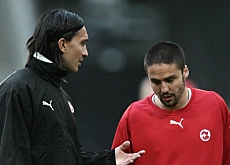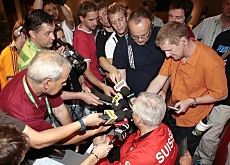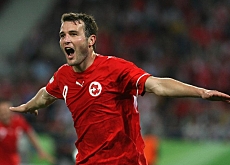Ethnic mix gives Swiss national team strength

Switzerland's ability to bind together a cocktail of different ethnic backgrounds has been a crucial ingredient of their footballing success in recent months.
The Swiss squad at the World Cup in Germany is composed of players from all parts of the country, but also includes Turkish, Balkan, Spanish, Italian and African influences.
Switzerland confounded expectations by qualifying for the first knockout stage of the World Cup by finishing top of their group ahead of favourites France, and did not concede a goal.
Midfielder Ricardo Cabanas believes the team’s core strength lies in its unity and an unflinching desire to overcome problems by employing the traditional Swiss strength at resolving conflicts.
“This team has been built up since 2002 and we are used to playing together and being together,” he told swissinfo.
Cabanas says that tensions are unavoidable, but that steps are always taken to resolve conflicts before they get out of hand, with communication playing a key role.
“We have to speak together or everything goes wrong,” he added. “Switzerland is a small nation on the football stage and we only have a with limited number players so we have to be united.”
Ethnic backgrounds
Defender Johan Djourou, who was born in Ivory Coast but moved to Switzerland at the age of 17 months, believes Switzerland’s increasingly multicultural identity has played a part in the team unity.
“In Switzerland we are used to dealing with people with different ethnic backgrounds and who speak different languages. That is reflected in how the squad communicates and gets along with each other,” he said.
“During meal times it is common to see the French speakers and German speakers gather in groups, but we are all united for the common cause.”
Not all 23 members of the squad in Germany have spent their time in the spotlight. But the players who warm the substitute’s bench are aware that they too play a vital role.
Mauro Lustrinelli has played just four minutes in three games, but that was enough time to set up a crucial goal for Tranquillo Barnetta in the match against Togo.
“For weeks I had to work hard to get myself mentally prepared to play the substitute’s role. When I finally came onto the field in Dortmund I felt an incredible emotion,” he admitted.
“When I got the ball my first instinct was to shoot, but I saw Tranquillo and I knew it would be better for the team to pass the ball.”
Waiting game
Defender Stéphane Grichting has been another fixture on the bench and one player who has yet to get onto the pitch. But he insists that the team comes before his own interests.
“The place of substitute is to accept things when good results are flowing. We have all made sacrifices to be present in Germany,” he said.
“Sometimes it is frustrating when others are in spotlight, but you have to accept it. The further we go in the competition, the greater the chance that we will all be able to show what we can do.”
swissinfo, Mathias Froidevaux and Matthew Allen in Bad Bertrich
Defender Johan Djourou was born in Ivory Coast, Valon Behrami in Kosovo and Blerim Dzemaili in Macedonia.
Ricardo Cabanas’s parents are Spanish, Hakan Yakin’s are Turkish, Tranquillo Barnettas’s are Italian while Philippe Senderos has a Spanish father and Serbian mother.
The Swiss are appearing in their eighth World Cup finals, reaching the quarterfinal stage in 1934, 1938 and 1954 (the year they hosted the tournament).
Their last appearance before this year was in 1994 when they were knocked out in the round of 16 by Spain.
This year, Togo’s World Cup campaign was disrupted by arguments over pay bonuses. Coach Otto Pfister resigned and then returned to the team and the players threatened to boycott their game against Switzerland before being persuaded to play. Togo finished bottom of Group G without a single win.
In 1994, Germany’s influential midfield playmaker Stefan Effenberg was sent home from the US after a bust-up with the team’s coach, Berti Vogts. Germany also suffered an early exit.
The same year Holland travelled to the US without legendary player Ruud Gullit after he stormed out of the squad and retired from international football after a series of rows.

In compliance with the JTI standards
More: SWI swissinfo.ch certified by the Journalism Trust Initiative



You can find an overview of ongoing debates with our journalists here. Please join us!
If you want to start a conversation about a topic raised in this article or want to report factual errors, email us at english@swissinfo.ch.